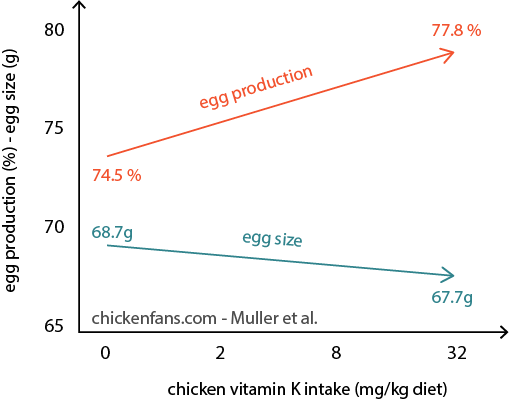Vitamin K for Laying Hens
Research on Leghorns in 2009 shows that higher levels of vitamin K supplementation improve egg laying performance and bone mineralization. Adding vitamin K supplements to a chicken’s diet improves bone structure during growth. It also prevents osteoporosis for laying hens.
The vitamins in a laying hen’s diet directly affect the number of nutrients in the egg. If you want to hatch an egg, vitamin requirements are much higher than for table eggs. Sufficient vitamin levels give the embryo a much higher chance for survival and reinforce the post-hatch growth of chicks.
The vitamin K levels in the egg also vary depending on the diet. Supplementation with vitamin K1 results in eggs high in vitamin K1 and K3 (from the feed). Supplementation with vitamin K3 almost doubles the amount of vitamin K3 in the eggs and has minimal to no vitamin K1 content.
For chickens raised for meat, low levels of vitamin K are associated with the presence of blood and bruises in the carcasses. Bruises and blood spots can occur in all types of muscles.
Blood in chicken meat results from hemorrhages, which is blood loss from damaged blood vessels. They can be caused by extreme environmental conditions, electrical stunning, harsh muscle activity, and everything that can inflict trauma on the muscles. Another problem is the occurrence of petechiae, small round spots on the skin that result from bleeding.
All these symptoms can be linked to capillary fragility caused by marginal deficiencies in vitamin K. With any impaired activity of vitamin K, the blood clotting process takes much longer, ultimately resulting in visual quality defects.
Post time: Jun-30-2023

